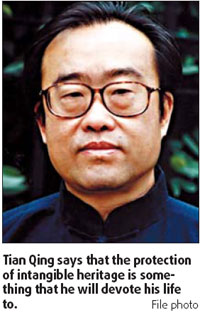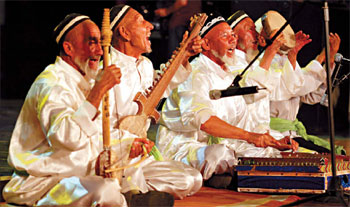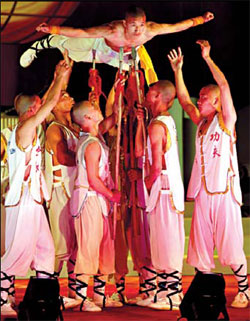Saving the precious past
Tian Qing is constantly haunted by the rumbling sound of bulldozers. The deputy director of the Intangible Cultural Heritage Preservation Center of China fears that so much of his nation's culture is still under threat despite the media attention his campaigning receives.
"Although intangible cultural heritage has come into focus in recent years, the speed and strength of protection is lagged behind that of modernization," said Tian. "Every day we hear the noise of bulldozers, and feel people's desire to bid farewell to old stuff."
A group of Uygur elderly artists perform Muqam, a kind of Uygur folk art that involves music, dance and poetry. |
Tian was very upset when he saw that all the white walls and black roofs of a distinguished town in southern China was replaced by modern villas during his last trip to the town.
"It's a disappearance of not only traditional architecture, but also of the carrier of our cultural heritage such as art, folk festivals and community activities," he said.
"Many traditional constructions are being demolished every day, which totally destroys the environment of cultural heritage's existence."
Right now Tian is organizing a series of performances of some endangered Chinese operas in early June. According to him, there were about 380 Chinese operas in the 1960s, but now half of them have disappeared.
"We are racing with the modernization of China, which is lifting our living standard greatly but at the same time killing cultural varieties," said he.
Always wearing a traditional Chinese-style shirt with cloth fasteners, Tian believes that the protection of intangible heritage is something that he has to devote all his life to.
Since he became the deputy director of the Intangible Cultural Heritage Preservation Certer of China last year, the ethnomusicologist-turned leader had to give up most of his academic research. "It's a pity, for I'm at the golden age of a researcher and should be writing the most important works of my academic career," said 59-year-old Tian.
"But this is also my luck, for I'm working to preserve something as important as my life."
Tian said he was not a prophet in cultural preservation. During the "cultural revolution" (1966-76), he was engaged like other red-guards in destroying the "four olds".
Having studied composition in the 1970s, he spent years teaching Western composition techniques and history of Western music. Only after a bit of self-reflection did he re-evaluate his work and reorient his career. "I just woke up a little earlier than other people," he said.
Monks performs Shaolin Kung Fu, which has been listed as a national intangible cultural heritage. Zhang Zihong |
At the 11th competition in 2004, another minority singer Li Huaixiu gave a wonderful performance but didn't qualify for the final because of the different opinions of the judges. At the suggestion of Tian, a new group for traditional folk singing was set in the next competition in 2006, and Li won the first prize.
Talking about his work at the Intangible Cultural Heritage Preservation Center of China, Tian said, "In the past I was calling for the preservation of intangible heritage with an individual's voice, and now I have the ability to do more work with my position."
Tian believes there were many problems related to today's protection theories and existing practices in China, which require experts' devotion to research, especially in the international communication field. He expects the upcoming First Extraordinary Session of UNESCO's Intergovernmental Committee for the Safeguarding of the Intangible Cultural Heritage to be helpful in this way.
This meeting will take place from today to May 27 in Chengdu, capital of Southwest China's Sichuan Province. More than 200 foreign experts from 20 countries will attend the Chengdu conference. It is the first time that UNESCO has held the event in China.
From May 22-25, Chengdu will also hold a China International Intangible Cultural Heritage Festival and International Seminar on Intangible Cultural Heritage.
At the seminar, Tian will talk of the problems in the preservation of intangible cultural heritage in China. For example, some local governments emphasize much more on the application rather than the protection, for they often use the banner of protecting intangible cultural heritage to develop their local tourism, said Tian.
In addition, Tian contends that there should be some strict rules and principles for the evaluation of the heritage inheritors. "Only those who grasp a kind of stunt and make livings on the skill by several generations could be titled the inheritors. Moreover, they should be trained by an inherent and traditional way," he said.
He illustrated that a Traditional Chinese Medicine (TCM) doctor, who was from a medical school and received modern education, could not be called the inheritor of TCM, even if he is celebrated. He said it is similar to some singers who are famous for singing folk songs and trained by professional music theories.
Besides analyzing the situation of future world intangible culture heritage protection, Tian said at the UNESCO session Chinese experts are more likely to raise suggestions in winning more objective and favored policies for the application of China's intangible cultural heritage.
Application for the UNESCO's list of masterpieces of oral and intangible cultural heritage of humanity takes place every two years, and each country can only apply one item a time.
So far, three Chinese items have been listed by UNESCO as masterpieces of oral and intangible heritage of humanity: Kunqu Opera, the art of guqin (seven-stringed Chinese zither), and the art of Uygur Muqam of Xinjiang, a kind of folk art that involves music, dance and poetry. The Urtiin Duu-Mongolian Traditional folk Long Song was listed as an joint item of China and Mongolia.
China proclaimed its first list of national intangible cultural heritage last year, which consists of 518 items, and the second list will be released in June. "If we can only apply one item a time for the world intangible cultural heritage, it will take thousands of years for all of China's national intangible cultural heritage to be recognized by UNESCO," said Tian.
"It's not fair for a big and culturally rich country like China to have the same quota as that of a small country with short history and less culture heritage."
A showcase of Chinese intangible cultural heritage exhibition was held at the international intangible culture heritage center in Paris in April, winning strong acclaim.
The audience applauded for more than 20 minutes after a concert of traditional Chinese music.
Tian cites a UNESCO official as saying "you have conquered all of us, your effort to preserve the intangible culture heritage is a great shock to developed countries, and a great encouragement to developing countries."
"Compared with the protection work of the developed countries, we started late, but we are devoting more determination and enthusiasm to it," Tian said.
(China Daily 05/23/2007 page18)
















